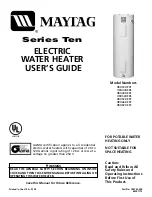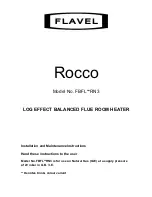
10
TEMPERATURE-
PRESSURE RELIEF
VALVE
COLD INLET
WATER LINE
HOT OUTLET TO
HOUSE
THREADED TO
SWEAT COUPLING
3/4
″
THREADED
NIPPLE
3/4
″
THREADED
NIPPLE
FLOOR DRAIN
DISCHARGE PIPE
(Do not cap or plug)
THREADED TO
SWEAT COUPLING
6
″
AIR GAP
HOT
COLD
SHUT-OFF
VALVE
Water Piping
Instructions for Installation (cont’d)
*See illustration on page 9 for mixing valve usage.
If a water heater is installed in a closed water supply system;
such as one having a back-flow preventer, check valve, water
meter with a check valve, etc. in the cold water supply; means
shall be provided to control thermal expansion. Contact the local
utility or call a Maytag Service Specialist at 1-800-365-0024 for
an authorized servicer on how to control this situation.
NOTE: To protect against untimely corrosion of hot and cold
water fittings, it is strongly recommended that di-electric
unions or couplings be installed on this water heater when con-
nected to copper pipe.
NOTE: The secondary anode rod/hot outlet nipple and the
cold inlet nipple are packaged separately with the water
heater. The above parts must be installed in the appropriate
HOT and COLD water connection locations.
The illustration shows the attachment of the water piping to
the water heater. The water heater is equipped with
3
⁄
4
inch
water connections.
NOTE: If using copper tubing, solder tubing to an adapter
before attaching the adaptor to the cold water inlet connection.
Do not solder the cold water supply line directly to the cold
water inlet. It will harm the dip tube and damage the tank.
1. Look at the top cover of the water heater. The water outlet
is marked hot. Connect the hot water pipe to the hot water
outlet of the water heater.
2. Look at the top cover of the water heater. The cold water
inlet is marked cold. Connect the cold water pipe to the
cold water inlet of the water heater.
NOTE: Your water heater is super insulated to minimize
heat loss from the tank. Further reduction in heat loss can
be accomplished by insulating the hot water lines from the
water heater.
*
WARNING
HOTTER WATER CAN SCALD: Water heaters are intended
to produce hot water. Water heated to a temperature
which will satisfy clothes washing, dish washing, and
other sanitizing needs can scald and permanently injure
you upon contact. Some people are more likely to be per-
manently injured by hot water than others. These include
the elderly, children, the infirm, or physically/mentally
handicapped. If anyone using hot water in your home fits
into one of these groups or if there is a local code or state
law requiring a certain temperature water at the hot
water tap, then you must take special precautions. In addi-
tion to using the lowest possible temperature setting that
satisfies your hot water needs, a means such as a mixing
valve, should be used at the hot water taps used by these
people or at the water heater. Mixing valves are available
at plumbing supply or hardware stores. Follow manufac-
turers instructions for installation of the valves. Before
changing the factory setting on the thermostat, read the
“Temperature Regulation” section in this manual.
T&P Valve and Pipe Insulation
Remove insulation for T&P Valve
and pipe connections from carton.
Fit pipe insulation over the
incoming cold water line and the
hot water line. Make sure that the
insulation is against the top cover
of the heater.
Fit T&P Valve insulation over valve. Make sure that the insula-
tion does not interfere with the lever of the T&P valve.
Secure all insulation using tape.










































